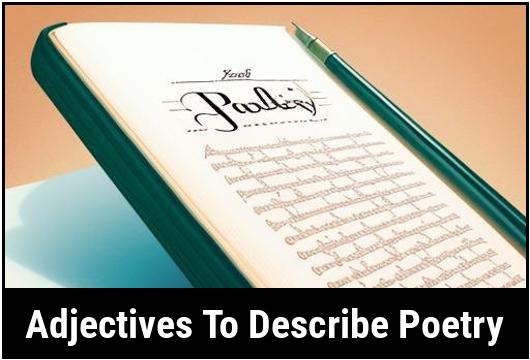- You are here:
- Home »
- adjectives
- » 31 Adjectives To Describe Poetry

31 Adjectives To Describe Poetry
Poetry is a form of literary art that uses language to evoke emotion, convey a message, or tell a story. It is a medium through which writers can express their thoughts, feelings, and experiences, often using vivid imagery, rhythmic patterns, and carefully chosen words. Adjectives play a crucial role in conveying the nuances and intricacies of poetry. They help to paint a vivid and evocative picture, allowing readers to fully immerse themselves in the poet’s world.
Key Takeaways
- Adjectives are essential in describing poetry as they add depth and enhance the imagery, mood, and tone of the work.
- Choosing the right adjectives can bring out the emotional impact and evoke specific sensory experiences within a poetic piece.
- Various types of adjectives can be employed to describe different aspects of poetry, such as form, style, imagery, and emotion.
Adjectives To Describe Poetry
1. Evocative
Poetry possesses the ability to evoke deep emotions within us. It takes us on an emotional journey, triggering memories, desires, and thoughts, all through carefully chosen words.
2. Thought-Provoking
Poetry prompts us to delve into introspection and contemplate profound questions about life, love, and the human condition. Metaphors, symbolisms, and analogies employed in poems awaken our minds and encourage us to think critically.
3. Vivid
A captivating poem paints elaborate and vivid scenes in our minds. It uses descriptive language to create sensory experiences, transporting us to different places, times, and emotions.
4. Melancholic
Melancholy is a feeling often associated with poetry. It beautifully captures the bittersweet moments, longing, and nostalgia, evoking a sense of wistfulness that resonates with many readers.
5. Captivating
Stirring curiosity, poetry captures our attention and holds it till the very last line. Its captivating nature stems from its ability to convey complex ideas in succinct forms, leaving us enthralled.
6. Prophetic
Poetry is sometimes prophetic, providing us glimpses into the future or shedding light on events yet to unfold. It can foresee societal changes or reflect the pulse of the world, acting as a guide for generations to come.
7. Musical
Intrinsically melodious, poetry embraces rhythm, meter, and rhyme. Its lyrical qualities make it akin to music, enhancing its impact and immersing us in the harmonious arrangement of words.
8. Expressive
Through a myriad of poetic devices and techniques, poets skillfully express their thoughts, beliefs, and emotions. Poetry creates a space for the authors to communicate with the reader in ways that surpass ordinary language.
9. Imaginative
Poetry ignites our imagination, prompting us to envision the whimsical and the fantastical. It pushes the boundaries of the real world, paving the way for improbable and imaginative scenarios.
10. Passionate
Passion radiates from within the lines of poetry. It expresses intense emotions, whether love, desire, anger, or hope, in a way that can resonate with the depths of our souls.
11. Transformative
Poetry possesses the power to transform the reader’s perspective and outlook on life. It challenges preconceived notions, offering fresh insight, and inspiring personal growth.
12. Memorable
Great poetry can leave an indelible mark on our consciousness. It lingers in our thoughts, long after we have turned the last page, etching its beauty and wisdom into our memory.
13. Authentic
Poetry celebrates authenticity, honoring individuality and unique experiences. Its personal nature resonates with readers, helping them find solace and understanding within the vulnerable and truthful words.
14. Sensual
Poetry embraces the senses, celebrating touch, taste, smell, sight, and sound. Descriptions of sensations create a sensuous experience for the reader, teetering on the edge of the physical and the metaphysical.
15. Enigmatic
Certain poems are intentionally veiled in mystery, invoking a sense of intrigue and fascination. These enigmatic verses invite readers to embark on a journey of interpretation and discovery.
16. Empathetic
Through empathy, poetry bridges the gap between different communities, cultures, and perspectives. It helps us understand and share the feelings and experiences of others, fostering compassion.
17. Harmonious
Poetry often finds balance and harmony through its use of carefully chosen words and structures. It organically weaves together diverse elements, creating a seamless whole that is both pleasing and satisfying.
18. Eloquent
Featuring precise language and eloquent expressions, poetry captures ideas and emotions with a rare elegance. Each word is carefully selected, making every line a masterpiece of articulation.
19. Reflective
Poetry offers a safe space for self-reflection, encouraging readers to introspect and gain deeper insights into their own lives. It mirrors our experiences and aspirations, serving as a beacon of understanding.
20. Visionary
At times, poetry transcends the present moment, offering visionary glimpses of a different reality. It challenges societal norms and inspires readers to envision a world filled with hope, equality, and love.
21. Transformative
Poetry possesses the power to transform the reader’s perspective and outlook on life. It challenges preconceived notions, offering fresh insight and inspiring personal growth.
22. Exquisite
In its most sublime form, poetry is simply exquisite. It leaves us awestruck, enthralled by its beauty, complex emotions, and delicate intricacies.
23. Universal
Although poetry often bears the author’s personal imprint, its themes touch upon the universal aspects of the human experience. This universality allows poetry to resonate across cultures, languages, and time.
24. Inspirational
Poetry has the power to inspire and move us to action. It encapsulates the human spirit, giving us the motivation to pursue our dreams, overcome challenges, and create positive change.
25. Profound
In its depth and complexity, poetry offers profound insights into the human condition. It delves into fundamental questions of existence and challenges us to ponder the intricacies of life.
26. Nurturing
Poetry can be a soothing balm for the soul, offering comfort, healing, and solace in difficult times. Its nurturing qualities help us find strength and resilience amidst adversity.
27. Revolutionary
Throughout history, poetry has played a pivotal role in igniting social change and revolution. It has sparked movements and challenged oppressive systems, empowering generations to fight for justice and equality.
28. Timeless
Great poetry transcends the boundaries of time. It speaks to us across centuries, reminding us of our shared humanity and reminding us that the human experience remains more similar than different.
29. Introspective
Poetry initiates a journey of self-discovery. It takes us within ourselves, encouraging introspection, and leading us to unearth deeper truths about who we are and our place in the world.
30. Graceful
At its best, poetry possesses an inherent grace and elegance. It glides through our consciousness with a gentle rhythm, leaving an indelible mark on our hearts with its effortless beauty.
31. Transformative
As we come to our final adjective, we circle back to the transformative nature of poetry. This remarkable art form has the power to change lives, challenge perspectives, and inspire new possibilities.
Why Use Adjectives To Describe Poetry
Adjectives are fundamental in depicting the multifaceted nature of poetry. They provide color, texture, and depth to the language of a poem, often imbuing it with tangible sensory experiences. Through adjectives, poets can vividly describe the world they are portraying, transforming abstract concepts into tangible and relatable experiences for the reader. Furthermore, adjectives help in conveying the emotional resonance and the mood of the poet, enabling readers to connect with the underlying sentiments and themes of the work. By using the right adjectives, a poet can create a profound impact, leaving an indelible impression on the audience.
How To Choose The Right Adjective To Describe Poetry
Selecting the appropriate adjectives to describe poetry involves a nuanced approach that takes into account the specific aspects of the poetic piece. Consider the following factors when choosing adjectives to describe poetry:
1. Understanding The Theme And Message
Before choosing adjectives, it is imperative to grasp the central theme, message, and emotional tone of the poem. This understanding will guide the selection of adjectives that align with the intended mood and atmosphere of the piece.
2. Analyzing Imagery And Symbolism
Carefully analyze the imagery and symbolism employed within the poetry. This analysis will help in choosing adjectives that effectively capture the visual, auditory, and sensory elements present in the poem.
3. Considering The Poet’s Style And Voice
Each poet has a distinct style and voice, and it is important to consider these aspects when selecting adjectives. The adjectives should reflect the poet’s unique approach and contribute to the overall presentation of their work.
4. Evaluating Emotional Impact
Assess the emotional impact the poet aims to achieve. The chosen adjectives should amplify the emotional resonance and enable readers to empathize with the sentiment embedded within the poem.
5. Language And Sound
Take into consideration the language and sound patterns utilized in the poetry. Adjectives that reflect the musicality and rhythm of the language will enhance the auditory experience of the poem.
Types Of Adjectives For Describing Poetry
Adjectives can be categorized into various types, each catering to specific aspects of poetry. Understanding these types of adjectives will aid in effectively describing the diverse elements present in a poetic composition.
1. Descriptive Adjectives
Descriptive adjectives are used to vividly depict the sensory details and visual imagery within a poem. These adjectives bring to life the colors, textures, shapes, and emotions evoked by the poet’s language. They enable readers to visualize and connect with the tangible elements portrayed by the poet. Examples of descriptive adjectives include "serene," "vibrant," "melancholic," "ethereal," and "resplendent."
2. Emotional Adjectives
Emotional adjectives are employed to convey the underlying sentiments and mood of the poetry. They capture the emotional landscape woven into the fabric of the poem, allowing readers to empathize with the feelings and experiences articulated by the poet. Emotional adjectives include "hopeful," "nostalgic," "tumultuous," "bittersweet," and "melancholic."
3. Stylistic Adjectives
Stylistic adjectives pertain to the form, structure, and literary devices utilized in the poetry. These adjectives elucidate the unique stylistic choices employed by the poet, such as alliteration, metaphor, enjambment, and symbolism. They help in delineating the artistic intricacies of the work and shed light on the poet’s craftsmanship. Examples of stylistic adjectives are "metaphorical," "lyrical," "abstract," "symbolic," and "rhythmic."
4. Sensory Adjectives
Sensory adjectives aim to evoke specific sensory experiences within the reader. They appeal to the senses, allowing the audience to immerse themselves in the sights, sounds, smells, tastes, and textures described in the poetry. Sensory adjectives include "fragrant," "sonorous," "tactile," "radiant," and "silken."
5. Comparative And Superlative Adjectives
Comparative and superlative adjectives are used to draw comparisons and emphasize the degree or intensity of certain characteristics within the poetry. These adjectives highlight the relative qualities or superlative essence of the depicted elements, adding depth and emphasis to the descriptive language. Examples of comparative and superlative adjectives are "brighter," "most profound," "quieter," "loudest," and "softer."
6. Metaphorical Adjectives
Metaphorical adjectives employ figurative language to liken one thing to another, often enhancing the poetic imagery and symbolism. These adjectives enable the poet to create striking and imaginative parallels, infusing the language with layers of meaning and depth. Metaphorical adjectives include "starlit," "fiery," "oceanic," "lunar," and "silvery."
Adjectives serve as the palette with which poets paint their intricate and evocative portraits in the realm of poetry. By selecting the right adjectives, poets can effectively convey the emotive, sensory, and stylistic dimensions of their work, thereby captivating and engrossing their audience. Understanding the diverse types of adjectives and their applications within poetry empowers writers and readers alike, enabling a deeper appreciation and interpretation of the profound beauty and artistry encapsulated within poetic expression. Embracing the power of adjectives in describing poetry elevates the experience of engaging with this timeless and enchanting form of literary art.
Examples Of Adjectives For Different Types Of Poetry
When it comes to expressing our thoughts and feelings about poetry, it can sometimes be challenging to find the right words. Poetry, with its vivid imagery, evocative language, and emotional depth, deserves to be described with equally powerful and precise language. This is where adjectives play a crucial role. Adjectives in poetry can enhance the reader’s experience, paint a clearer picture, and evoke the intended emotions.
Poetry comes in various forms, each with a unique style and tone. Adjectives can capture these nuances and help convey the essence of different types of poetry. Let us delve into some examples:
1. Romantic Poetry
Romantic poetry, known for its focus on love, beauty, and nature, can be described using adjectives such as:
- Tender: Expressing gentle and affectionate feelings.
- Passionate: Showing intense emotions and desire.
- Enchanting: Having a captivating and magical quality.
- Serene: Conveying a calm and peaceful atmosphere.
- Ethereal: Characterized by delicate and heavenly qualities.
An example of an adjective describing romantic poetry could be "The verses in this romantic poem evoke a passionate longing for love."
2. Haiku
Haiku, a traditional Japanese form of poetry, often captures the beauty of nature and fleeting moments. Some adjectives that work well for haiku include:
- Simple: Conveying a minimalist and uncomplicated style.
- Delicate: Depicting something fragile and subtle.
- Evocative: Summoning vivid and powerful imagery.
- Zen-like: Exhibiting a sense of calmness and tranquility.
- Pensive: Reflective and thoughtful.
For example, "This haiku skillfully uses simple yet evocative language to capture the essence of a falling leaf."
3. Sonnet
Sonnets, with their structured rhymes and 14-line format, are often used to express deep emotions. Appropriate adjectives for sonnets may include:
- Melancholic: Eliciting a sense of sadness and wistfulness.
- Majestic: Conveying grandeur and awe-inspiring qualities.
- Intimate: Creating a sense of closeness and personal connection.
- Poignant: Evoking strong emotions or touching moments.
- Rhythmic: Describing the musical and metrical qualities.
For instance, "The poet’s use of majestic language in this sonnet amplifies the intensity of their emotions."
4. Free Verse
Free verse poetry is characterized by its lack of formal structure and rhyme scheme. Here are adjectives that can describe free verse:
- Experimental: Trying new ideas and unconventional styles.
- Subversive: Challenging traditional norms and expectations.
- Fluid: Having a natural and smooth flow of words.
- Impressionistic: Depicting emotions and impressions rather than concrete details.
- Raw: Displaying unfiltered and unpolished emotions.
An example sentence highlighting the use of adjectives for free verse poetry could be: "The poet’s fluid and impressionistic writing style in this free verse poem allows the reader to experience a myriad of emotions."
5. Epic Poetry
Epic poems, known for their extensive length and grand narratives, can be described using the following adjectives:
- Heroic: Celebrating heroic deeds and noble characters.
- Mythical: Incorporating elements of mythology and legends.
- Grandiose: Exhibiting impressive and larger-than-life qualities.
- Timeless: Remaining relevant and impactful through the ages.
- Dramatic: Conveying a sense of intensity and theatricality.
For example, "The epic poem’s grandiose descriptions of battles transport the reader to a mythical world."
Common Mistakes In Using Adjectives To Describe Poetry
While adjectives can elevate our descriptions of poetry, it is important to avoid common mistakes that may hinder the effectiveness of our writing. Here, we discuss some things to be mindful of:
1. Avoid Overuse Of Vague Adjectives
Using vague adjectives such as "nice," "beautiful," or "good" may not provide a clear picture of the poem. Instead, strive for more specific and evocative adjectives to convey your thoughts and enable readers to better understand the nuances.
2. Use Adjectives In Context
It is essential to use adjectives that align with the context and tone of the poetry. For instance, using light and playful adjectives to describe a somber and tragic poem would create a jarring effect. Ensure that the descriptive words you choose appropriately reflect the emotions and themes of the poem.
3. Be Authentic And Genuine
When describing poetry, the adjectives you use should genuinely reflect your own feelings and interpretation. Avoid using clichéd or generic adjectives that do not convey your true thoughts. This authenticity brings a unique perspective and adds depth to your writing.
4. Avoid Excessive Adjective Clutter
While adjectives can enhance our descriptions of poetry, using too many can overwhelm the reader or dilute the impact. Instead, focus on selecting a few powerful adjectives that effectively capture the essence of the poem.
Using Adjectives Effectively
To effectively use adjectives when describing poetry, consider the following tips:
1. Read And Analyze
Reading and analyzing a poem carefully will help you identify its themes, moods, and emotions. Pay attention to the words the poet uses and the overall structure. This understanding will guide you in selecting appropriate adjectives that reflect the essence of the poem.
2. Use Metaphors And Similes
Metaphors and similes can be powerful tools when describing poetry. By comparing a poem to a familiar object or experience, you can create a vivid and relatable image in the reader’s mind. For example, "The poet’s words dance across the page like a ballerina gracefully gliding on stage."
3. Consider The Five Senses
Engaging the reader’s senses can create a more immersive experience. Describe how the poem sounds, smells, tastes, feels, or looks. This multisensory approach can make the reader feel more connected to the poem. For instance, "The poet’s words have a velvety texture that ignites a sweet nostalgia."
4. Focus On Emotion
Poetry often evokes intense emotions. Highlight the emotional impact of the poem by using adjectives that effectively convey those feelings. Consider words like "heart-wrenching," "exhilarating," "soothing," or "haunting." These adjectives evoke an emotional response and deepen the reader’s connection with the poem.
5. Experiment With Word Order And Placement
The placement and order of adjectives can significantly impact the reader’s perception. Experiment with different placements to see which ones create the desired effect. Placing an adjective at the beginning can grab attention, while ending a sentence with an adjective can leave a lasting impression.
Exercises And Practice
To improve your skills in describing poetry using adjectives, try the following exercises:
1. Adjective Swap
Choose a poem and read it carefully. Then, write down all the adjectives that come to mind while reading. Afterward, revisit your list and try swapping out some of the adjectives with more precise or evocative alternatives. Consider the impact of these changes on your understanding and perception of the poem.
2. Create A Poem Description
Select a favorite poem and write a brief description of it using adjectives. Focus on capturing the essence, emotions, and mood of the poem. Share your description with others and discuss how your choice of adjectives influences their interpretation of the poem.
3. Analyze Adjective Usage
Pick a few poems from different genres and carefully analyze the adjectives used by the poets. Consider how the adjectives enhance the reader’s experience and contribute to conveying the poem’s themes and emotions. Reflect on how you can incorporate similar techniques into your own writing.
Conclusion
Adjectives are indispensable when it comes to describing poetry effectively. By choosing the right adjectives, we can enhance the reader’s experience, evoke emotions, and capture the essence of different types of poetry. It is essential to avoid common mistakes, such as using vague adjectives or cluttering the description with excessive words. By reading and analyzing poetry carefully, using metaphors and similes, and considering the sensory experience, we can master the art of describing poetry with powerful and evocative adjectives. So, embrace the magic of language, experiment with your words, and let your descriptions breathe life into the world of poetry.
FAQS On Adjectives To Describe Poetry
What Are Adjectives Used To Describe Poetry Often?
Adjectives can be used to describe poetry in a variety of ways, but some common ones include beautiful, powerful, evocative, lyrical, and profound.
How Can Adjectives Enhance The Understanding Of Poetry?
Adjectives can add depth and nuance to the meaning of poetry and help readers better understand the emotions, imagery, and overall impact of the poem.
How Can The Use Of Adjectives Vary Between Different Types Of Poetry?
The use of adjectives can vary greatly depending on the style, theme, and structure of the poem. For example, a love poem may use romantic adjectives like passionate, tender, and dreamy while a nature poem may incorporate descriptive words such as serene, majestic, and vibrant.
What Role Do Adjectives Play In Creating Mood And Tone In Poetry?
Adjectives are essential in setting the tone and creating a specific mood in poetry. Words like haunting, melancholic, and nostalgic can convey a sense of sadness or longing, while words such as whimsical, playful, and lighthearted can create a more light-hearted and upbeat tone.
Are There Any Specific Techniques For Effectively Using Adjectives In Poetry?
While there are no strict rules for using adjectives in poetry, it is important to choose words that enhance the overall meaning and feel of the poem. Writers often use sensory adjectives to appeal to the reader’s senses and create a vivid image or emotion. It is also important to avoid overusing adjectives and to use strong, specific words instead of generic ones.








